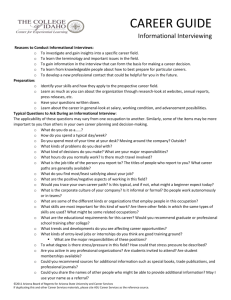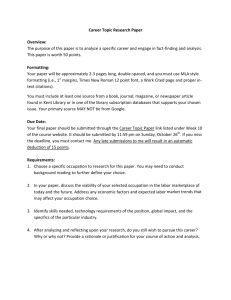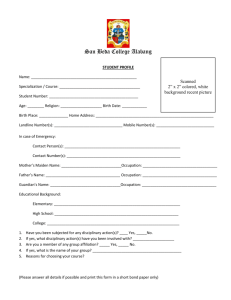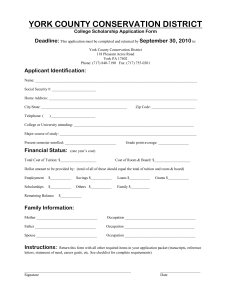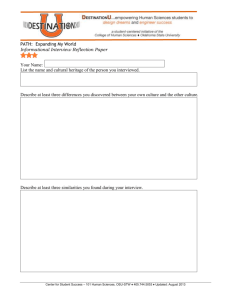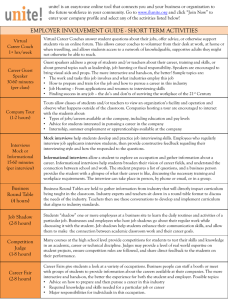INFORMATIONAL INTERVIEWING
advertisement
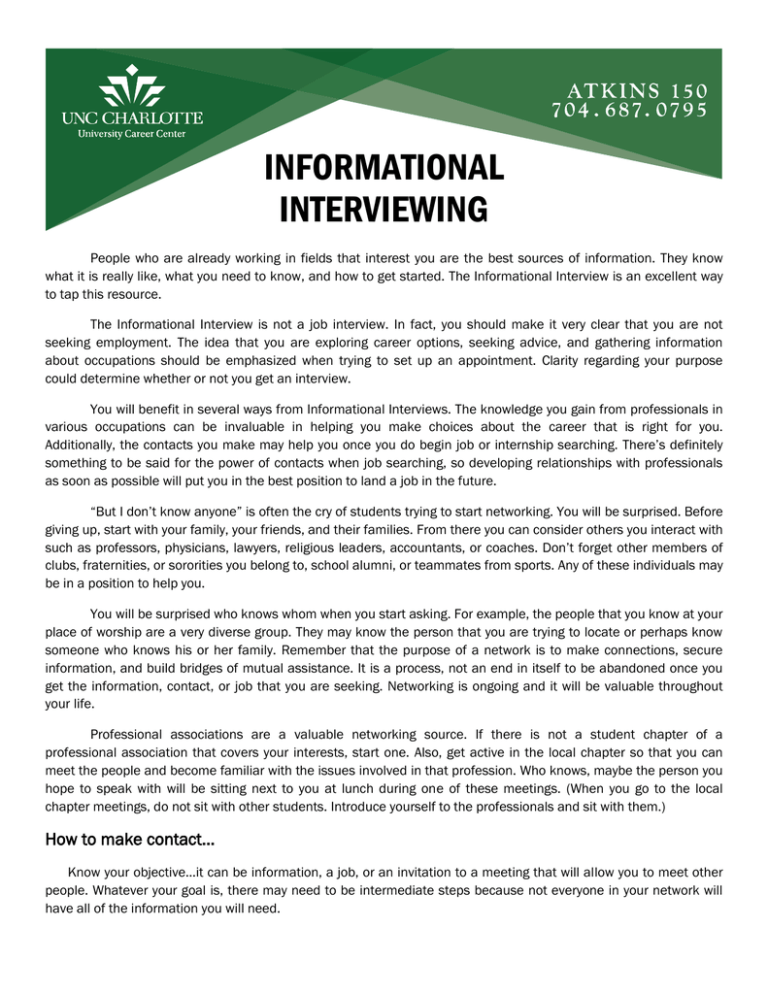
INFORMATIONAL INTERVIEWING People who are already working in fields that interest you are the best sources of information. They know what it is really like, what you need to know, and how to get started. The Informational Interview is an excellent way to tap this resource. The Informational Interview is not a job interview. In fact, you should make it very clear that you are not seeking employment. The idea that you are exploring career options, seeking advice, and gathering information about occupations should be emphasized when trying to set up an appointment. Clarity regarding your purpose could determine whether or not you get an interview. You will benefit in several ways from Informational Interviews. The knowledge you gain from professionals in various occupations can be invaluable in helping you make choices about the career that is right for you. Additionally, the contacts you make may help you once you do begin job or internship searching. There’s definitely something to be said for the power of contacts when job searching, so developing relationships with professionals as soon as possible will put you in the best position to land a job in the future. “But I don’t know anyone” is often the cry of students trying to start networking. You will be surprised. Before giving up, start with your family, your friends, and their families. From there you can consider others you interact with such as professors, physicians, lawyers, religious leaders, accountants, or coaches. Don’t forget other members of clubs, fraternities, or sororities you belong to, school alumni, or teammates from sports. Any of these individuals may be in a position to help you. You will be surprised who knows whom when you start asking. For example, the people that you know at your place of worship are a very diverse group. They may know the person that you are trying to locate or perhaps know someone who knows his or her family. Remember that the purpose of a network is to make connections, secure information, and build bridges of mutual assistance. It is a process, not an end in itself to be abandoned once you get the information, contact, or job that you are seeking. Networking is ongoing and it will be valuable throughout your life. Professional associations are a valuable networking source. If there is not a student chapter of a professional association that covers your interests, start one. Also, get active in the local chapter so that you can meet the people and become familiar with the issues involved in that profession. Who knows, maybe the person you hope to speak with will be sitting next to you at lunch during one of these meetings. (When you go to the local chapter meetings, do not sit with other students. Introduce yourself to the professionals and sit with them.) How to make contact… Know your objective…it can be information, a job, or an invitation to a meeting that will allow you to meet other people. Whatever your goal is, there may need to be intermediate steps because not everyone in your network will have all of the information you will need. Know what you’re going to say when you phone or approach your contact. Don’t write a script, but do have in mind how you are going to introduce yourself and what you are seeking. For example, a telephone conversation might go something like this: You: “Hello, my name is _________. Is Ms. Smith in?” Secretary: “May I tell her why you are calling?” You: “Mr. Jones from your finance department referred me to her about her work with Central American banks.” Ms. Smith: “Hello.” You: “Ms. Smith, my name is ________, and I am a student at UNC Charlotte majoring in finance. The purpose of this call is not to ask you for a job, but to seek your advice. Joe Jones in your finance department told me that you would be a good person to talk with about my interest in Central American banking. I did some field work in Argentina last summer and really strengthened my Spanish. I would like to ask you a few questions. Could we set a time at your convenience when we could talk for about 15 minutes?” What to Do and How Investigate all of the different settings where people work in the careers that interest you. For example, if you are considering nursing, examine positions in hospitals, doctor’s offices and clinics, community health centers, rehabilitation centers, schools and colleges, and research facilities. Or if you are studying physical education, also look into community recreation or corporate wellness. It is also desirable to obtain more than one perspective on the careers of interest to you. Interview individuals who hold these positions and their supervisors or department heads. (Keep in mind that it is often easier to start with the boss and then be “sent down” to the level where you might start.) Talk to people in more than one organization because jobs can differ greatly depending on the work environment of individual employers. People employed in the jobs that you are interested in can provide great information on: A realistic idea of their work day Information on the types of organizations that hire in the field Current ranges on starting salaries and future earnings Information on advancement opportunities The skills and credentials necessary to secure employment The employment demand for people in their field Advice on where to look for jobs in the field Supervisors or department heads, on the other hand, can provide additional information on: An overview of the structure of the organization Advice about other related jobs Advice on getting started in the field and what they seek when hiring Advice about career progressions Referrals to other people in the field Try to conduct your first interviews with people whom you know so that you can become polished at the process before you venture out into the unknown. At the end of an informational interview, always ask the interviewee for a referral to another person or two in the field from which you may obtain further information. In this way you will develop you own network of contacts. If you have exhausted all of your personal resources or cannot find a contact in an organization that you want to penetrate, call the general switchboard number. Ask who is in charge of the division or department that performs the type of work that you are researching. Write down that person’s name, job title, phone number and office location. Then, telephone that person to arrange an appointment. If you cannot determine the proper person to contact, call the highest person in charge and start there. It will be easier for that individual to refer you down. Sample Questions for Informational Interviewing How did you get into this occupation? What entry-level jobs might qualify a person for this occupational field? What responsibilities and duties do you have in your work? What skills, aptitudes, or personal qualifications do people need for this occupation (or to work in this organization)? What preparation, education, training, or background is required for entrance into this field? What is the guiding philosophy of this organization? What personal traits, values, and interests are necessary or helpful to succeed and advance in this occupation/ organization? What personal qualities do administrators and supervisors look for in their employees here? What do you like best about your occupation/organization? What do you wish you could change? How would you describe the working conditions in this occupation/organization: hours, dress, morale, work styles, management styles? What are the beginning, average, and top salaries in this occupation? What are the fringe benefits offered? – DON’T ASK – What is your salary? What are the opportunities for advancement, promotion, or job changes in the occupation/organization? What is a typical day at work like in your occupation/ organization? Adapted from the UNC Greensboro Career Services Center
